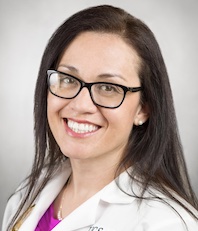Q & A with Nicole Lopez

Nicole Lopez, M.D., M.A.S., is an associate professor of surgery in the Division of Colon and Rectal Surgery, the disease team leader for colorectal cancer and the director of the National Accreditation Program for Rectal Cancer at UC San Diego. She also directs several courses for medical students at UC San Diego and serves as a mentor to many trainees in the Department of Surgery.
February 26, 2025 | Interview by Samantha Phan
Did you always know you wanted to be a surgeon?
No, I didn’t. When I was in medical school, I considered surgery as one of the things that I definitely did not want to do. I had this idea that surgeons were mean or had terrible lives. So, when I chose my rotations, I put surgery first because I thought I would be terrible at it. But instead, I ended up having a lot of fun. I loved the people, working with my hands and feeling accomplished at the end of the day.
Why did you choose to pursue two surgery fellowships?
I had a hard time picking what specialty I would want to do as a fellowship. I had initially decided to do surgical oncology because I enjoyed having long-standing relationships with patients during difficult times. But, during my chief year, I had a ton of fun during a six-month service with Sonia Ramamoorthy, M.D., the current chief of the Division of Colon and Rectal Surgery. Working with Sonia was just special, and I wanted to be more like her. She is extremely charismatic — and very convincing!
Still, it took some time for me to realize what I wanted to do. Ultimately, Sonia helped me decide that, after my surgical oncology fellowship, I would do a colorectal surgery fellowship as well.
Were there any mentors that shaped your path in the surgery field?
I think that many people shaped my training, whether they knew how influential they were or not. Andrew Lowy, M.D., Sonia Ramamoorthy, M.D., Bruce Potenza, M.D., Anne Wallace, M.D., and Sarah Blair, M.D., were a few who influenced my training and continue to be unbelievably supportive — each of them has something special to offer. Having such wonderful people around and being able to take bits from each of them is fantastic.
You now work with medical students and residents at UC San Diego. How did your experiences as a trainee influence your training approach?
When I first got feedback on my technical skills as a trainee, I remember it being mentally difficult. So, the first thing I try to tell trainees is that I know I’m being annoying and I’m sorry. Usually, people understand. They know this is an important process in advancing critical thinking and technical skills.
I also make sure they know that my way is just one way of doing things. They should have lots of different approaches in their toolkit as they start their careers.
Why do you feel mentorship is so important in surgery?
Sometimes, you don’t know what you don’t know. In my case, I didn’t know what specialty would be right for me. Mentors helped me with that decision process. So, I think mentors can be there for when you need guidance and help knowing how to proceed. They can see when you might be a little off track and gently nudge you in the right direction.
Do you have any advice for aspiring surgeons?
I think that surgery is an extremely rewarding career and anybody who loves it can become a surgeon. It is a lot of work, and it does take a lot of time, but so does any career in medicine, so if you love surgery, please just do it!
